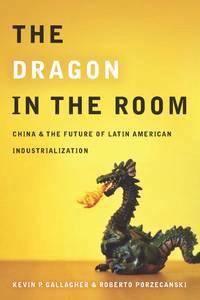Dragon room : China and the future of latin american ind
Gallagher, Kevin P. / Porzecan
Éditeur : STANFORD UNIVERSITY PRESS
ISBN papier: 9780804771887
Parution : 2010
Code produit : 1140371
Catégorisation :
Livres /
Gestion /
Économie /
Commerce international
Formats disponibles
| Format | Qté. disp. | Prix* | Commander |
|---|---|---|---|
| Livre papier | En rupture de stock** |
Prix membre : 33,38 $ Prix non-membre : 37,09 $ |
*Les prix sont en dollars canadien. Taxes et frais de livraison en sus.
**Ce produits est en rupture de stock mais sera expédié dès qu'ils sera disponible.
Description
In the eyes of many, China's unprecedented economic rise has brought nothing but good news to the countries of Latin America and the Caribbean. Indeed, China's growing appetite for primary products, and the ability of Latin America to supply that demand, has played a role in restoring growth in Latin America, both in the run-up to the global financial crisis and in its aftermath. The dragon in the room that few are talking about is the fact that China is simultaneously out-competing Latin American manufacturers in world markets—so much so that it may threaten the ability of the region to generate long-term economic growth. One of the authors' key claims is that China is rapidly building the technological capabilities necessary for industrial development, whereas Latin American tech innovation and sophistication lags considerably. At a deeper level, the findings in this volume imply that China's road to globalization, one that emphasizes gradualism and coordinated macro-economic and industrial policies, is far superior to the "Washington Consensus" route taken by most Latin American nations, particularly Mexico.























